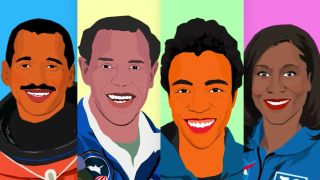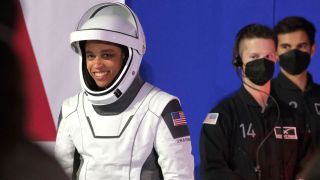'The Color of Space': Watch NASA's new documentary celebrating Black space explorers for Juneteenth
The 50-minute video includes a joint conversation between seven current and former Black astronauts. It airs Sunday, June 19.
A new NASA documentary featuring the achievements of numerous Black astronauts will premiere today (June 19), during Juneteenth.
The 50-minute documentary, entitled "The Color Of Space," will be available to watch starting at 12 p.m. EDT (1700 GMT). You can catch it in the video above, or on NASA TV, the NASA app, NASA social media channels, and the agency's website.
A free, in-person screening will also take place at Howard University in Washington on Saturday at 7 p.m. local time; details on registration and activities are available at this website.
"Anchoring the documentary is a powerful and thought-provoking conversation between seven current and former Black astronauts, each of whom were selected to become part of NASA's astronaut corps and train for missions to space," agency officials wrote in a Thursday (June 16) announcement about the documentary.
Related: Charles Bolden, NASA's 1st Black administrator, speaks out on systemic racism

Juneteenth is a federal holiday commemorating the practical end of slavery in the United States. It falls on the anniversary of June 19, 1865, commemorating emancipation for 250,000 enslaved people in Texas who were freed after a Union army took over the previously Confederate-held state, according to the Smithsonian Institution.
This event happened two years after the Thirteenth Amendment of 1863 abolished most forms of slavery in the United States; Confederate states ignored the amendment throughout the Civil War, which was ongoing during this era.
Get the Space.com Newsletter
Breaking space news, the latest updates on rocket launches, skywatching events and more!
The positive moment of Juneteenth, however, was followed by many difficult decades in the Black community. Some of the many examples included institutions shutting down access to forms of wealth such as home ownership and bank accounts, the Jim Crow era of so-called "separate but equal" facilities leading to long-term underfunding in Black communities, violence and threats against Black individuals, and other forms of systemic racism persisting into the present.
The documentary includes numerous Black figures within NASA commemorating the achievements of Black people in space exploration. It also premieres during a historical moment for the Black community, as Jessica Watkins is conducting the first long-term stay by a female Black astronaut on the International Space Station.
The seven-astronaut conversation featured in the documentary includes current NASA astronauts Stephanie Wilson, Victor Glover and Jeanette Epps, as well as retired astronauts Bernard Harris, Robert Curbeam, Bobby Satcher and Leland Melvin.

Melvin has spoken out before about the racism he faced as a young football player and how, if things had gone differently, he might have ended up in prison instead of at NASA.
These astronauts "spoke about their journeys and their motivations" during a March 25 event at Space Center Houston, NASA said. The panel was moderated by NASA Johnson Space Center director Vanessa Wyche, the first Black woman to lead a NASA center.
Other Black astronauts are featured as well, the agency said. "The documentary also includes rare archival footage and interviews with Guion 'Guy' Bluford, the first Black man in space; Charlie Bolden, retired astronaut and first Black NASA administrator; former astronauts Alvin Drew and Joan Higginbotham; and Ed Dwight, America's first African-American astronaut candidate," NASA said.
(Bluford was the U.S.'s first Black astronaut in space but didn't fly until 1983, even though the space program started flying people in 1961.)
In a 2020 Space.com interview, Bolden discussed the systemic racism he faced throughout his career, and among many other measures, called for more representation in the astronaut office by both "women and minorities."
The contributions of Black Americans to the space program extend back decades. The "Hidden Figures", who were Black engineers and mathematicians at NASA in the 1950s and 1960s, made crucial contributions to the early years of the agency.
Recent Black milestones in space have included NASA astronaut Victor Glover becoming the first Black astronaut to complete a long-duration mission in 2020-21 and Inspiration4 astronaut Sian Proctor becoming the first Black female to pilot a space mission in 2021.
Follow Elizabeth Howell on Twitter @howellspace. Follow us on Twitter @Spacedotcom and on Facebook.
Join our Space Forums to keep talking space on the latest missions, night sky and more! And if you have a news tip, correction or comment, let us know at: community@space.com.

Elizabeth Howell (she/her), Ph.D., is a staff writer in the spaceflight channel since 2022 covering diversity, education and gaming as well. She was contributing writer for Space.com for 10 years before joining full-time. Elizabeth's reporting includes multiple exclusives with the White House and Office of the Vice-President of the United States, an exclusive conversation with aspiring space tourist (and NSYNC bassist) Lance Bass, speaking several times with the International Space Station, witnessing five human spaceflight launches on two continents, flying parabolic, working inside a spacesuit, and participating in a simulated Mars mission. Her latest book, "Why Am I Taller?", is co-written with astronaut Dave Williams. Elizabeth holds a Ph.D. and M.Sc. in Space Studies from the University of North Dakota, a Bachelor of Journalism from Canada's Carleton University and a Bachelor of History from Canada's Athabasca University. Elizabeth is also a post-secondary instructor in communications and science at several institutions since 2015; her experience includes developing and teaching an astronomy course at Canada's Algonquin College (with Indigenous content as well) to more than 1,000 students since 2020. Elizabeth first got interested in space after watching the movie Apollo 13 in 1996, and still wants to be an astronaut someday. Mastodon: https://qoto.org/@howellspace
